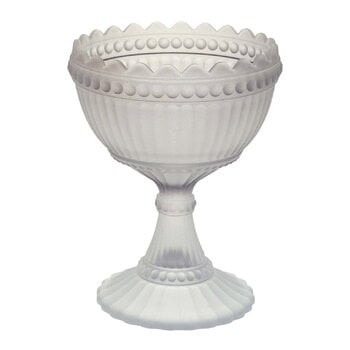Mariskooli is the fruit of a collaboration between two iconic Finnish brands, Iittala and Marimekko. A staple for all fans of Finnish design, the beloved bowl can be used for serving dessert, sweets or snacks or simply as a decorative object – available in an array of beautiful colours and decorated with scalloped edges, fluting and four rings of glass bubbles, the Mariskooli bowl adds an elegant touch to any table setting or décor.
In production since the 1960s, Mariskooli has also become a cherished, sought-after collector’s item. The story goes that it was Marimekko’s founder, Armi Ratia, who made the design popular by using Mariskoolis at one of her famous garden parties. Mariskooli bowls are made at the Iittala glassworks in Finland.



